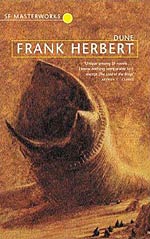
![]() verkisto
verkisto
7/26/2016
![]()
This is another re-read for me, in preparation of finishing off the rest of the books in the series. It went a lot faster this time around, partly because I didn't have to stop every third page to look up what a gom jabbar was, or who the Kwisatz Haderach was, or what the shai hulud was. In fact, I think I should write a quiz for people who haven't read the Dune books and title it "Swedish Metal Band or Word from Dune?" (though I expect there may be some overlap between the two).
Anyway, as I was reading the book, I realized that it and A Song of Ice and Fire have some similarities. The books have a tremendous political background that drives the story, the protagonists have honorable intentions, but aren't necessarily the "good guys," and there were some thematic elements that I found shared between the books. The female characters particularly reminded me of those from Martin's series, because they were represented as people who didn't have much power in the society, but found ways to gain what power they could from the situations around them. Jessica and Chani both had these characteristics, where even though they were subservient in their roles, they weren't subservient by nature. Aside from Jessica becoming a damsel in distress once she and Paul were forced into the desert after the Duke's death, both were portrayed as strong women. I've read some criticism of the novel, mostly saying that it's dated, particularly in the way that women are portrayed, but I find that the characters have a feminist angle that's very subtle.
Also, Samuel Delaney made a comment about Baron Harkonnen being a negative portrayal of homosexuals, which totally surprised me. The Baron is a despicable character, and part of the way Herbert makes him despicable is through his sexual preference, but there's a big difference between being attracted to men, and being attracted to young boys. Harkonnen isn't gay; he's a pedophile. I'm surprised that a gay man didn't make that distinction, as it's already a mistake the general public makes about men who like young boys. That's not synonymous with gay.
Overall, though, I think the book holds up very well, even if it is somewhat light on plot. Herbert does a great job of describing the world of Dune and all its unique character without using a lot of info-dumps. Paul and his family are new to the world, and have a lot to learn about living on Arrakis and working with the Fremen. The descriptions flow naturally from the story, which is pretty impressive when you look at how much Herbert had to convey about the world and its ecology.
I understand that the sequels get a lot weirder, and that the sequels don't have the same level of renown as the first book, but I'm still interested in reading them. I've been looking forward to this step in my Unfinished Series project for a while now.